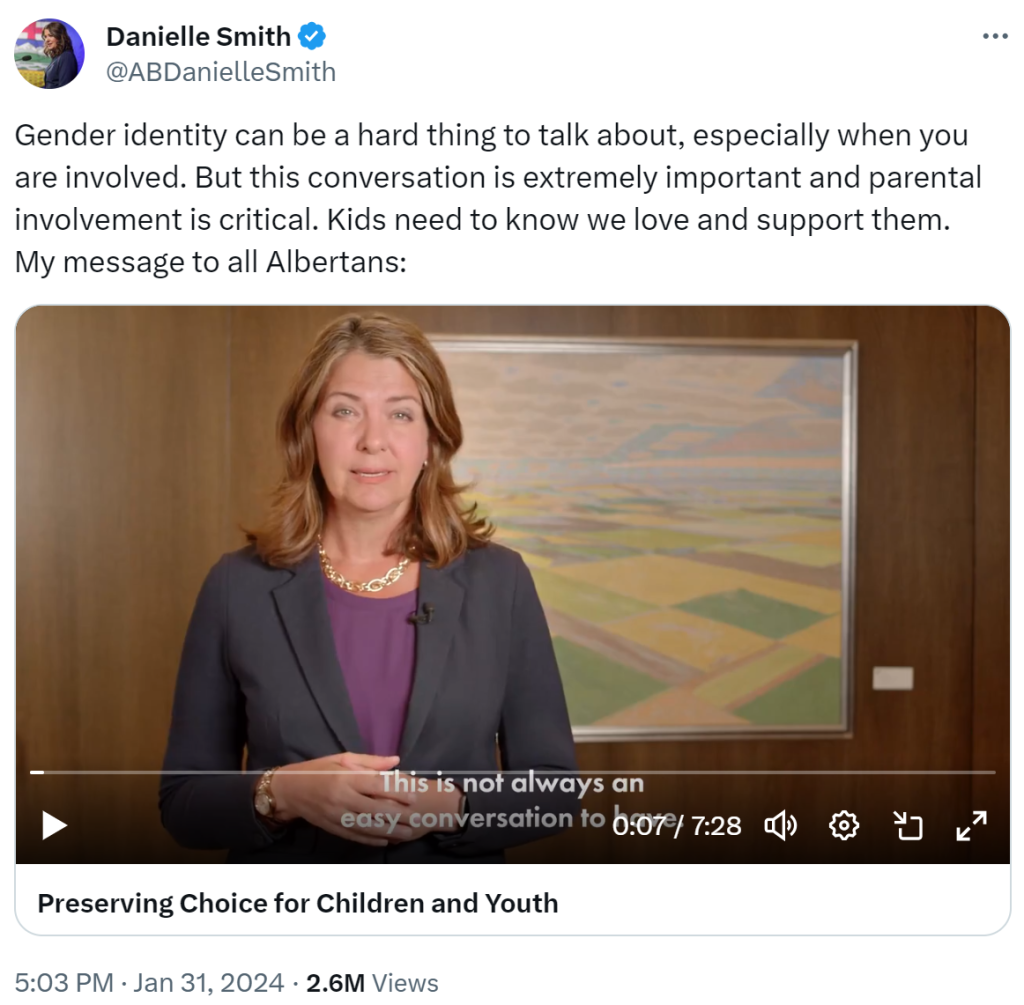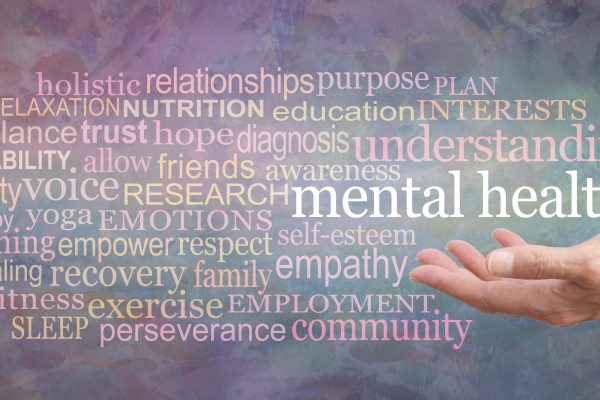Alberta Premier Danielle Smith issued a 7 minute statement yesterday to announce that gender identity policy changes are coming. The Premiers of New Brunswick and Saskatchewan have come under fire for announcing similar policies. Quebec announced that it will conduct a review of gender identity policies in schools and the panel they chose does not include trans-rights activists who’ve been influencing policy thus far.
Danielle Smith’s announcement signaled that broad and far-reaching changes are coming in Alberta. The tone of her message was warm and compassionate as well as direct and truthful and we believe this bodes well for her government’s chances of making the new policy changes stick. Smith has always taken a moderate approach when it comes to gender and sexual identity, and her announcement was in keeping with that position.

New gender policy changes coming in Alberta
Prematurely encouraging or enabling children to alter their very biology or natural growth no matter how well-intentioned or sincere, poses a risk to that child’s future that I, as Premier, am not comfortable with permitting in our province.
Premier Danielle Smith
No gender surgeries for under 18’s
Alberta public health insurance will not fund gender surgeries for under 18’s. This is an important statement even while Alberta already had this position. Provinces such as Ontario have no minimum age limit for gender surgery. Age restrictions were removed under Kathleen Wynne’s Liberal government a decade ago when the numbers of people seeking gender medicalization were infinitesimally small. That has changed drastically, with most of the people seeking gender medicalization being children and young people and where there is no high-quality evidence supporting the safety or long-term benefits of such interventions. Given the current situation, it makes sense that Alberta re-iterate that it has no plans to use public funds to surgically alter the bodies of adolescent boys and girls.
No hormonal interventions for under 16’s
Alberta public health insurance will no longer permit puberty blockers or cross-sex hormones to be prescribed to under 16’s. Smith said there would be an exception for those already started on hormones. Teens aged 16 and 17 will still be able to access puberty blockers and hormones as long as they possess the capacity to consent as well as physician and psychologist approval. Parental consent will also be required.
These changes are important as there is recognition that parents need to be involved and that capacity to consent to life-changing medical interventions is simply not possible for under 16’s. For under 18’s, the requirement for physician and psychologist approval will hopefully establish a clear assessment process that supports a young person in understanding the health consequences of their decision and helps them to better understand who they are as individuals and untangle their feelings about gender from other issues they may be experiencing through the turbulent adolescent years. This is actually the system that many Canadians seem to believe is still in place; a cautious and multi-disciplinary approach that involves mental health specialists.
These changes signal to children that the decision to change one’s physiology to achieve a gender ideal is an adult decision. Establishing clear boundaries with age limits is an important principle that recognizes the risks that come with these medical interventions.
Parents given an Opt-IN to classroom instruction on sex-ed & gender identity
Formal instruction on sensitive topics such as human sexuality and gender identity will require an Opt-IN from parents. Resources that can be used in schools will also need to be vetted and approved by the Ministry.
This requirement still leaves a loop-hole for “teaching moments” which can involve storybooks, videos and gender spectrum lessons on whiteboards among other things that activist teachers may think up, so Smith and team will have some work to do to hone this policy to ensure that “formal lessons” are those that include such resources. In our view, the Ministry of Education should also come up with an FAQ to support teachers in addressing questions and situations that may come up in class on an ad-hoc basis. It would be a significant step forward if the Ministry also identified language that is politically activist in nature and not appropriate for nurturing a safe and neutral school environment. There is simply too much leeway for educators and school boards to adopt an activist approach to gender in schools without any clear guidance or consequences.
Parental Notification and Consent for Name/Pronoun Changes at School
Parental notification and consent will be required for under 16’s who wish to change their name and gender at school. Parental notification, but not consent, will be required for children aged 16 and 17.
Smith notes that in most cases parents will love and support their children no matter what, and in the rare cases where abuse is happening, then child protection laws come into effect.
Pilot program for Family Counseling
Smith also announced that a pilot program involving counseling services for families where a child is considering gender transition will be offered. This is an excellent step forward to recognize the need for supporting the family unit and helping families work through different issues that may come up when one child is transitioning. Gender transition, even in the most supportive of families, imposes a high level of stress on younger and older siblings and parents who may feel differently about their child’s decisions and reasons for transitioning.
Female Category for Sport
Smith declared that there needs to be meaningful ways for transgender athletes to compete in sport, but that the advantages of being biologically male is a reality that gives males massive competitive advantage over women and girls. She called the current situation of males competing against women and girls in sport “divisive and sometimes dangerous”. Alberta will be working with sporting organizations to ensure that biological women and girls are not forced to compete against biological males.
Recognizing biological females as a distinct and valid category is a significant step forward and will bring back a reality-based framework while providing open categories for transgender women (males) who have biological advantages and differences.
The risks and unfair advantages that young women and girls are experiencing when competing with biologically stronger transgender females in sporting competitions have also grown too high.
Premier Danielle Smith
Conclusion
Smith struck the right tone in understanding the complexity and difficulties that young people identifying as transgender are experiencing. She was also supportive of transgender adults and announced expansion of healthcare services for transgender adults to receive the care they need in-province rather than traveling to the specialty gender surgery clinic in Quebec.
Overall, we’re very pleased with Alberta’s announcement that they will be overhauling policies related to gender identity ideology to ensure the safeguarding of children from irreversible harm and protecting fair sport for women and girls. In particular, there needs to be a clear distinction between adults and children so that clear assessment requirements can be established to safeguard young people who are prone to peer influence and social media harms. It is often the case that gender is not an enduring part of a young person’s identity. Given the current cultural trend to celebrate gender transitioning it is even more important to ensure that vulnerable young people are making the right choices for their future.




